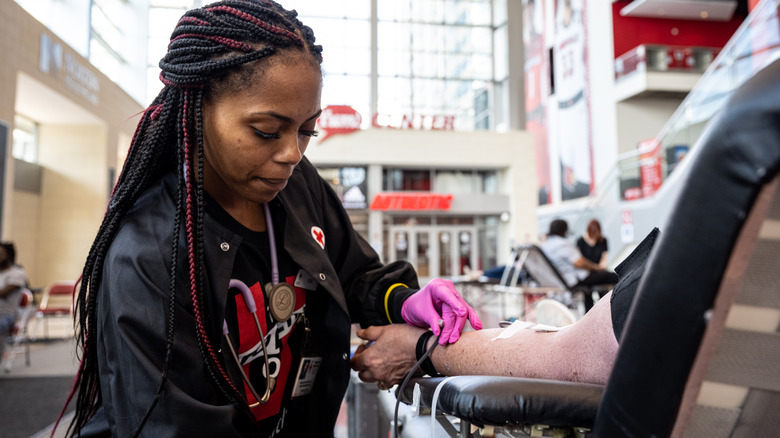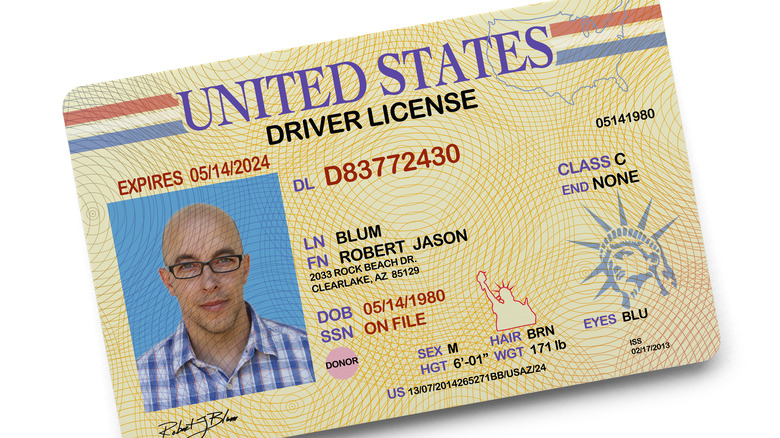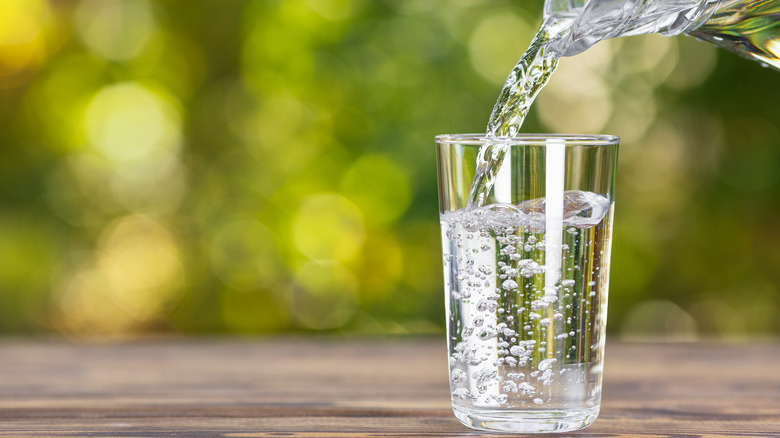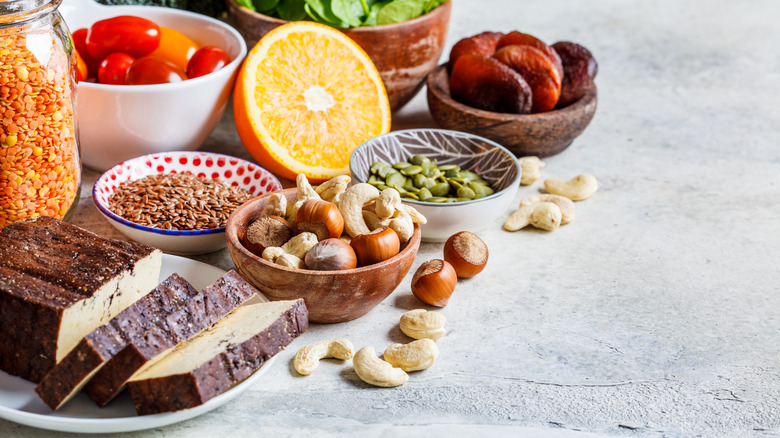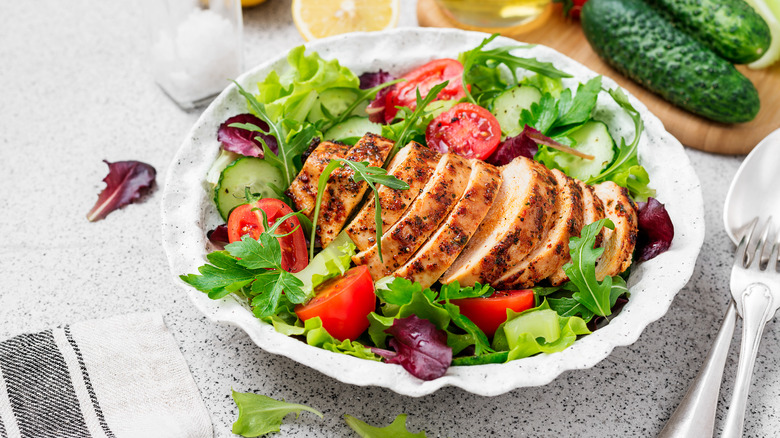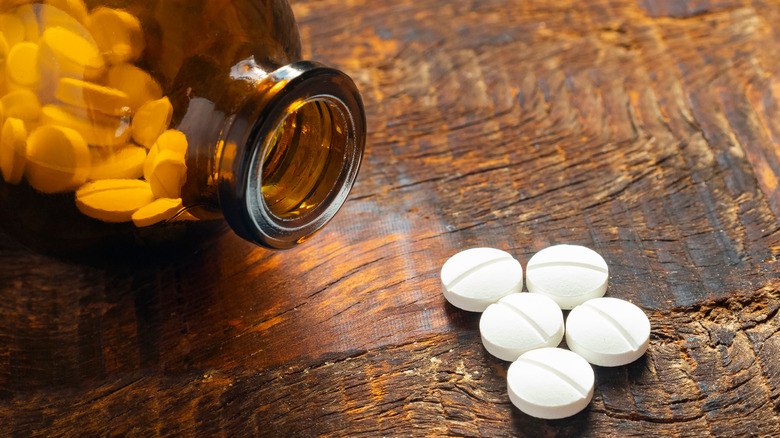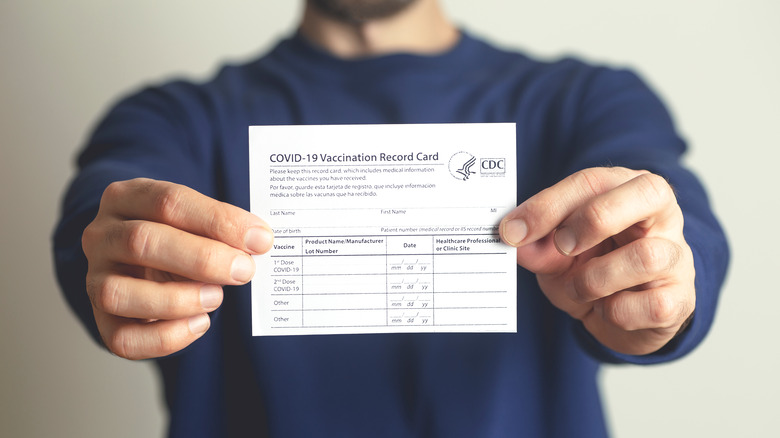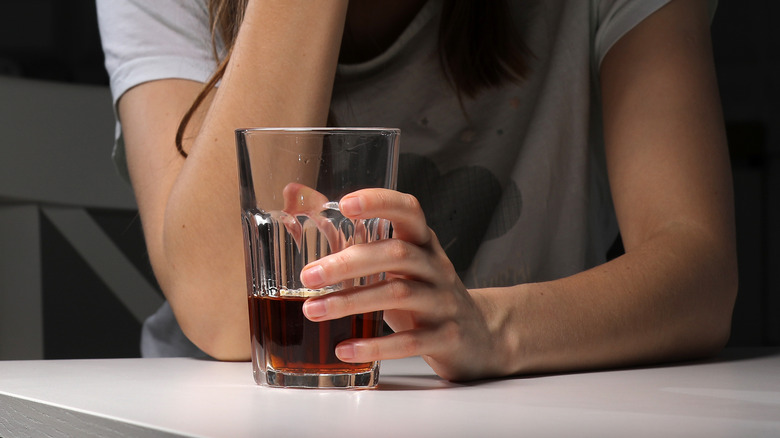Everything You Should Know Before Donating Blood
You've likely heard about the severe blood supply shortage in the United States. And you want to help. According to the Red Cross, every two seconds a person in the U.S. needs blood. Statistics indicate 36,000 units of red blood cells are needed for individuals every day in the United States. For platelets, 7,000 units are needed, and 10,000 units of plasma are required daily. One donation has the potential to save at least three lives. And remember, blood and platelets can only come from a human being — we cannot manufacture these blood resources. The need is obviously present for people to donate blood, so letting people know what is exactly required might help people make a decision on whether or whether not to donate.
The truth is blood donation is easy, but you need to be armed with what you can and cannot do before choosing to give your blood. Donating blood isn't meant to be intimidating. Check out these things you need to know before your appointment.
Make sure you meet the eligibility requirements
So you've made up your mind and want to give blood. Before you head to donate your blood, make certain you meet the minimum requirements to qualify to make a donation. There are specific parameters you must meet. Jessa Merrill, a Red Cross spokesperson, told Insider that a person who wants to donate must be at least 17 years old. In certain states, parents or guardians of 16-year-olds can consent to donation. You need to weigh at least 110 pounds, and you must present valid government-issued identification.
When you arrive at the appointment, you should expect to answer questions regarding blood safety, as well as whether you've traveled to certain regions that are impacted by Zika. According to the Red Cross, if you've received the COVID-19 vaccine, you will be expected to provide the manufacturer's name. As long as you're not experiencing any symptoms, you don't have to wait to make a blood donation if you've recently received the COVID-19 vaccine.
Arrive at the blood drive fully hydrated
Drinking water is key before you decide to donate blood. Melissa Perry, a registered dietitian, and the Red Cross recommend you drink at least 16 ounces of water over your requisite daily intake of 64 ounces (via Orlando Health). Over half of our bodies are composed of water and there is a possibility that if you are dehydrated, you may experience dizziness or a blood pressure drop when donating blood. As soon as you give blood, your body is losing water. As such, it is also a good idea to hydrate afterwards.
In order to remind yourself to drink water, it might be a good idea to carry a water bottle with you. You'll likely not forget to drink before and after donating if the water bottle is easily accessible. Drinking fluids even 30 minutes before your appointment can help with blood circulation and hydration (via Oklahoma Blood Institute).
Eat iron-rich foods
Before you donate blood, the testing site will likely first ask to draw a little blood by pricking your finger. This is to determine if your hemoglobin levels are sufficient. According to the Red Cross, the minimum level of hemoglobin for women is 12.5 grams per deciliter, while men must have 13 grams per deciliter. Low hemoglobin means you have deficient iron levels. The two types of iron are heme and non-heme iron. Heme iron is commonly found in meat as well as in poultry, whereas non-heme iron foods include beans, legumes, leafy greens, and certain cereals.
According to WebMD, "Heme iron is derived from hemoglobin. It is found in animal foods that originally contained hemoglobin, such as red meats, fish, and poultry (meat, poultry, and seafood contain both heme and non-heme iron). Your body absorbs the most iron from heme sources."
In an interview with Livestrong, Maxine Yeung, a registered dietitian, suggested eating an iron-rich meal prior to blood donation. She recommends eating high iron-fortified foods like cereals, spinach, apricots, prunes, and black beans. If you do decide to donate blood more than once a year, it might be a good idea to also take a vitamin that has extra iron, according to Dr. Jed Gorlin (via Livestrong).
You don't have to skip your morning exercise
What's the rule for those who like to exercise? Do you or don't you head to the gym before you donate blood? If exercise is a part of your normal daily routine, then you shouldn't skip it. But make certain you time your exercise correctly because you don't want to risk feeling sick or unwell during your blood donation appointment.
Dr. Sarah Vossoughi advises that those who want to head out for a run, hop on the elliptical, or lift weights should consider exercising before they donate the blood (via Health Matters). However, it's likely not a good move to exercise after donating blood. Vossoughi says she doesn't want people to feel dizzy. There is a risk of feeling lightheaded if you head straight to the gym after giving blood. And those who want to skip their workout altogether might welcome this news: "You've basically done your workout for the day once you've donated blood," confirmed Vossoughi.
You should be in good health
It's no surprise, but before you decide to donate blood, you must be in good health. The Red Cross says seasonal illnesses like the flu can interfere with a donor's ability to give blood. In addition, according to the World Health Organization, if you have a sore throat, cold, stomach bug, a cold sore, or any other infection, you cannot donate blood. Plus, if you've had any kind of minor dental work, you'll need to wait 24 hours until you donate blood. If you've had major dental work, you'll need to wait. a month. If you've recently gotten tattooed or pierced, you'll need to wait six months. You'll have to wait at least nine months after giving birth before you can donate blood.
If you've traveled outside the United States in the last three years, you may be asked to provide more details. According to the Red Cross, you may be asked which countries you visited, where exactly you traveled, what type of transportation you used, the duration of your trip, and when you came back into the United States. Travel to regions where malaria, dengue, and Zika are prevalent may prevent you from donating blood.
Eat healthy before your appointment
Eating healthy is a good way to prepare before donating blood. According to Orlando Health, eating foods high in Vitamin C and iron, as well as natural and unprocessed foods, will be best before donating blood. Meat and poultry, like beef and chicken, are wise choices, according to Flo Health. Consider shellfish and fish, such as haddock and tuna, as potential options, too.
Breakfast can include eggs, different types of bread, and cereals. Lunch and dinner can include vegetables like spinach and broccoli. Beans are also a good source of protein and a healthy part of your meal. If you'd like to have dessert but don't want anything packed with artificial sweets, try eating dried fruits, like dates and figs. Adding raisins is a good option too. They can be added to cereal or eaten plain after dinner. Mix them with a handful of nuts, like cashews, and you have an easy, healthy dessert or possibilities for snacks in-between meals.
Wear comfortable clothes
It's a good idea to dress well when you head to donate blood. No, that doesn't mean you have to get all dressed up. Instead, Jessa Merrill from the Red Cross told Insider that you should wear comfortable clothes, like a t-shirt or a shirt with sleeves that are easy to roll up. Blood will likely be drawn from your forearm so your sleeve must be able to push past your elbow.
Keep in mind that you may also want to dress comfortably because you'll likely be sitting back or lying down to have your blood drawn. Plus, you'll be there a while. Whole blood donation takes about 45 minutes, while plasma donation takes up to two hours and platelet donation may take three hours (via Insider). After the donation, you will likely have to wait until you feel well enough to walk and resume normal activities. You may feel cold soon after donating blood, so it's a good idea to bring a jacket or sweater with you. And if you have errands or need to attend an event after donating blood, plan accordingly.
Don't take aspirin before donating platelets
What if you took aspirin before your blood donation appointment? According to the Red Cross, taking aspirin won't prevent you from donating whole blood. However, if your plan is to donate platelets, you must wait two days before doing so. This, of course, applies to any medications that contain aspirin. "If you take aspirin products on Monday, the soonest you may donate platelets is Thursday," Red Cross confirmed. Blood centers need platelets for a wide variety of reasons — from helping people in traumatic accidents to those with cancer or ones receiving organ transplants.
Let the donation center personnel know when you've taken aspirin so they can let you know when it's the appropriate time to donate. The reasoning behind waiting is that aspirin may impact your platelets' ability to function in a proper way. You'll then have to wait the appropriate amount of time to allow your platelets to replenish.
Increase your intake of vitamin C
If you're donating blood, you want to make certain to load up on vitamin C. According to Healthline, Vitamin C will help your body absorb iron you receive from plants. Some of the foods that are rich in vitamin C include tomatoes, watermelon, raspberries, blueberries, strawberries, mango, papaya, pineapple, and kiwi.
Although eating iron is a good start before donating blood the body needs a way to properly absorb it and certain foods enhance that possibility. Registered dietitian Maxine C. Yeung told Livestrong that vitamin C prevents tannins, oxalates, calcium, and polyphenols from impairing iron absorption. And while you may think of citrus fruits as the source of vitamin C, Yeung confirmed, "Bell peppers actually have more vitamin C than oranges."
In an effort to avoid impairing iron absorption, individuals should try to avoid coffee, tea, high fiber foods, and foods high in calcium, like milk and cheese, prior to donating blood.
Avoid fatty foods
Prior to your blood donation, you want to eat as clean as possible and avoid processed foods. In an interview with Northwestern Medicine, Dr. Tiffany Chang suggested skipping fatty foods in particular as they increase the amount of lipids in your bloodstream. A blood sample with a high amount of lipids will be difficult to test for infection. And if your blood cannot be tested for infection, it won't be able to be used.
On the day of your appointment, avoid eating foods like doughnuts, muffins, and biscuits. It's wise to skip the drive-thru fast food places, as well snack foods like chips. Also, if you enjoy salad, then go light on the dressing. Of course, unhealthy desserts are off-limits as well. Try to eat light instead, incorporating leafy vegetables (think: spinach, kale, broccoli) and fruits (think: oranges or strawberries) into your meals prior to your blood donation.
Skip these beverages and chewing gum
You may think chewing gum is no big deal before your blood donation, but that may not be the case. A study in Transfusion indicated that chewing gum and drinking hot and cold beverages before your blood donation can impact your body temperature.
In this study, "Ten volunteer subjects were exposed to each of the three stimuli in separate studies. Oral and tympanic membrane temperatures were taken before exposure, immediately after exposure, and at various times until the subject's temperature returned to baseline." An elevated temperature could lead to postponing your appointment. The conclusion of this study states, "Drinking a hot beverage and, to a much lesser degree, gum chewing can lead to a deferral for elevated temperature, but subjects were acceptable by 5 minutes."
Surprisingly, though, that iced latte or ice water you're drinking could make matters even worse. "Cold beverages are of more concern, because they suppress the temperature for a short time and could theoretically lead to acceptance of a febrile, possibly infectious donor," the study confirmed. It's best to wait until your blood donation is over to resume these activities.
Know your medical history and where to go
In order to determine your eligibility to donate, you must bring proper documentation. According to the Centers for Disease Control (CDC), you'll need to bring photo identification. You should also have a list of all the names of over-the-counter or prescribed medications you may take. If you receive a COVID-19 vaccine, jot down the name of the vaccine manufacturer.
Knowing your full medical history is important if you want to donate blood. Not all blood can be donated because of the potential for infections. According to the Mayo Clinic, some conditions preclude people from donating. For example, if you've ever tested positive for HIV, babesiosis (a tick-borne disease), or received a blood transfusion in the U.K. or France in 1980 or later, you are likely ineligible. The CDC also recommends some tips to help calm your nerves prior to your appointment: Consider meditating, listening to music, or reading a book to help you relax.
If you're not sure where to go to donate blood, you can start with the websites of the American Red Cross, American Association of Blood Banks (AABB), America's Blood Centers, and Blood Centers of America. Additionally, the Red Cross has an app that allows you to look up blood drives in your area.
Avoid alcohol
There are certain types of drinks that impact your ability to donate. You want to avoid caffeinated drinks, as well as wine, beer, and other alcoholic drinks. Alcoholic beverages tend to cause dehydration. You should avoid drinking alcohol at least 24 hours before you decide to donate blood (via Healthline). It is also likely not the best idea to drink alcohol after donating blood since it might delay your recovery time. You will likely feel the impact of alcohol after donation since your blood is diluted.
A good way to stop yourself from drinking during the week of your blood donation is to keep it out of the house, set reminders on your calendar to not drink, and limit your social time during the evening times. If you do end up drinking alcohol, though, you should at least plan to drink extra water to compensate to prevent potential dehydration.

